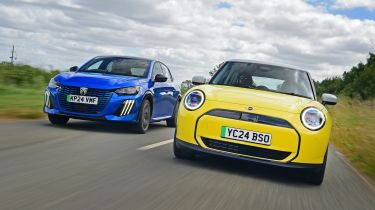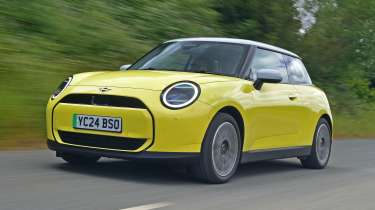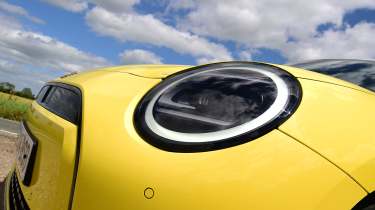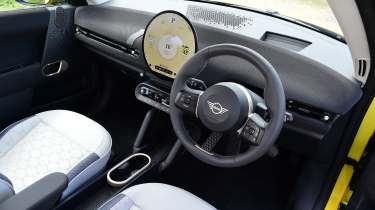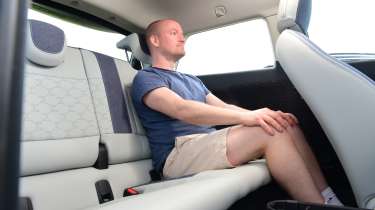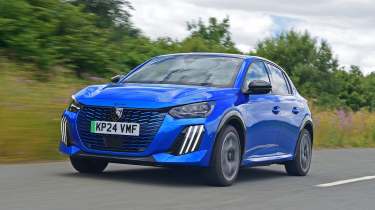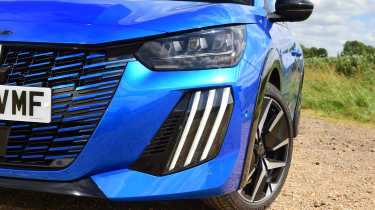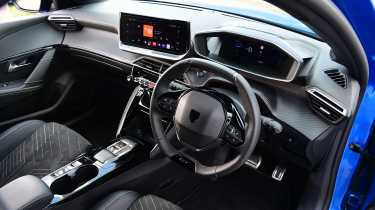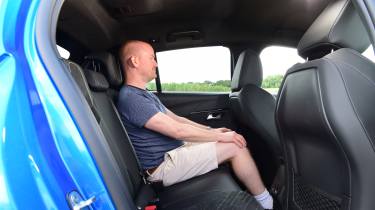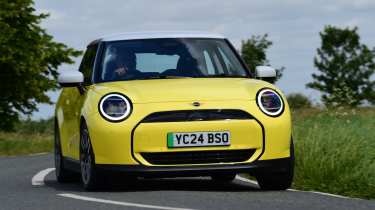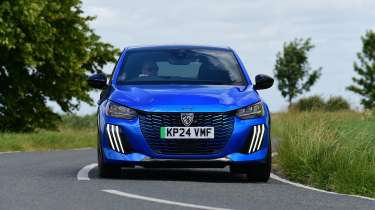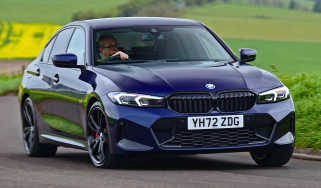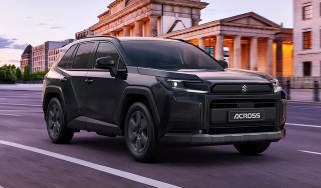MINI Cooper E vs Peugeot E-208: electric cars clash for supermini supremacy
The new MINI Cooper E takes on the updated Peugeot E-208 in an electric supermini clash
At a time when many manufacturers are turning to their past to find inspiration for their latest models, MINI has used heritage to brilliant effect for more than 20 years.
Since the brand’s relaunch under BMW back in July 2001, the MINI hatch has scored big for poshness in a compact body, and it has always moved with the times, including the launch of an electric version five years ago.
Today there’s an all-new MINI Cooper on the scene – the fourth since the brand’s rebirth. The new generation brings a larger electric line-up with updated EV technology, plus a range of other changes that come with a target of moving the company another step further forward.
From the retro to the entirely modern, one of the MINI’s key rivals is the Peugeot E-208. The French brand has managed to blur the lines between mainstream and premium cars in recent years, and the supermini’s quality and desirability lift it above many similarly priced alternatives.
As we’ll discover, for two cars occupying such a similar space in the market, they both go about things quite differently, and display very distinct talents as a result. But there can be only one winner.
| Mini Cooper E | Peugeot E-208 GT | |
| Price: | £30,000 | £32,850 |
| Powertrain: | 1x electric motor, 40.7kWh battery, 181bhp | 1x electric motor, 54kWh battery, 154bhp |
| 0-62mph: | 7.3 seconds | 8.2 seconds |
| Test efficiency: | 4.5 miles/kWh | 4.3 miles/kWh |
| Official range: | 190 miles | 248 miles |
| Annual VED: | £0 | £0 |
MINI Cooper E
Considering that late versions of the outgoing Mini Electric cost as much as £35,000, a £30,000 starting point for the new car is competitive, given its boost in powertrain and in-car tech. An example specced up to the level of our test model will cost you £32,520.
Tech highlights
While the last MINI Electric was adapted from the existing internal combustion-engined car, the Cooper E is completely separate from the petrol versions. Its architecture has been developed as part of a joint venture with Chinese maker Great Wall Automotive, and until 2026 the EV will be built in China, before manufacturing joins the rest of the MINI range at the Cowley plant in Oxford.
With 181bhp, the Cooper E has the same power output as the outgoing electric car, but the battery size has increased from 28.9kWh (usable) to 36.6kWh. That brings a boost in range; where the last car managed 141 miles (WLTP) on a charge, the new car raises that figure to 190 miles.
Another sign of progress is that this powertrain was formerly the reserve of the sporty MINI Cooper S, but now it’s the entry-level option. Today’s S gets a front-mounted motor producing 215bhp and 330Nm of torque. Its 6.7-second 0-62mph time only beats our test car’s by 0.6 seconds, but that’s thanks in part to the S’s heavier 54.2kWh battery.
While a modest battery size makes rapid charging less of a priority, it’s still slightly disappointing to see that the best that the MINI can offer is 95kW charging. And the smaller-battery model we have here can only manage 70kW.
Safety: Euro NCAP hasn’t tested the Cooper E yet, but it isn’t short of tech. Choose the optional Level 2 package, and you’ll get MINI’s Driver Assistance Plus tech, which combines adaptive cruise control with lane keeping. It’s among the smoothest systems of its type that we’ve tested.
On the road
An electric powertrain hasn’t changed the MINI’s fundamental character, which remains, for better and worse, about its chassis dynamics.
Around town: For a car so small, the Mini seems incredibly sturdy. The controls all feel solid without being unduly heavy, and there’s plenty of precision both in the way it’s possible to modulate the pedals so smoothly and in the precise steering.
It’s a little too solid in one area, however, and that’s the ride. The MINI constantly bounces over the tiniest of bumps that many other rivals don’t even notice. It’s clear that the damping quality is high, because it’s never crashy, but there are times when you wish the model were a little softer.
A & B-roads: The flipside of that firmness is a car that feels sharp and engaging. Body roll is almost non-existent, and with the weight of that battery set low and centrally in the chassis, stability and balance are impressively neutral.
You can play with the car’s attitude using a little mid-corner brake or throttle, but grip levels are so high that it’s almost hot hatch-fast on twisty roads. That’s helped by the punch you get out of corners from the torquey electric motor. A keen throttle response means that the Cooper E feels every bit as quick as its 7.3-second 0-62mph time suggests.
Motorway: The performance tails off only slightly at higher speeds, so the MINI still feels easily up to keeping pace with motorway traffic. Refinement and stability are great for a car so small, but the unsettled ride persists, which is a mark against an otherwise accomplished long-distance cruiser.
Ownership
Retro design has always played a big part in the BMW-owned MINI’s cabin designs, and improvements in touchscreen tech have allowed the latest version to take that even further.
A single, circular OLED display is inspired by the large speedometer of the original Alec Issigonis-designed Mini, leaving what few physical controls there are – including the drive switch, parking brake and driver-assist shortcut key – grouped closely below it, which we especially like.
Ergonomically it’s not perfect – the climate controls are on screen and they’re rather fiddly – but the simple design, the use of knitted-effect materials on the dash (made from 90 per cent recycled polyester) and the understated use of glossy plastics give a fabulous sense of quality and solidity that few rival models can compete with.
The cabin feels just as special at night, too, thanks to some well judged ambient lighting. This includes a chequered effect that is projected across the dashboard and plays with the textured surface in the dark.
MINI claims that the Cooper E will be capable of up to 4.5 miles per kilowatt hour, which is exactly what we achieved in the real world, and a number that ranks it among the most energy-efficient EVs around. With its relatively small battery, that impressive efficiency figure translates into a modest range of 165 miles. That number came in favourable temperatures for an electric vehicle, so we’d expect it to drop a little in winter, but conversely it also included many motorway journeys; we saw numbers closer to 5.0mi/kWh with a mix of town, suburban and A-road driving.
Storage: Cabin cubbies aren’t so abundant, but the large smartphone tray, deep cup-holders and a long (if slightly narrow) central storage area are useful for holding a variety of small items. The glove compartment is fairly spacious, too.
Practicality
The MINI is less than four metres long, so space was never going to be a strong point, but by city-car standards it’s perfectly fine.
Rear space: The clearest compromise is the fact that the MINI only has three doors. But once you’re inside, it’s really not too bad. Headroom in particular is great, and by accepting that it’s strictly for two in the back (there’s no centre seat), then each of the seats feel wide and supportive.
Predictably, it’s kneeroom that feels most cramped. If you have a tall driver who needs to wind the front seat all the way back, the seat squab touches the base of the seat behind, rendering it useless.
Boot: A 210-litre capacity is very small, but is adequate for shopping trips and a small suitcase or two. There’s lots of underfloor storage, too. The rear seats fold almost flat and fairly level with the boot, giving a volume of 800 litres in two-seat mode.
What to buy?
Which version we’d choose
- Powertrain: If the Cooper Electric will be your household’s sole car, then the SE’s larger battery is worth paying extra for. Official range climbs from 190 to 250 miles. There’s a little more performance, too, while the price increases by £4,500, although that includes the Level 1 pack, which is a £2,000 option on the E model.
- Trim: Whether you choose E or SE, there are Classic, Exclusive (£3,200 extra) and Sport (£3,500 more than Classic) specs. Each has unique exterior highlights, wheel designs and interior themes. These are largely cosmetic, so Classic will be good enough for most buyers.
- Our choice: We’d stick with Classic trim. It’s well equipped and looks smart.
Peugeot E-208
We’re testing the Peugeot E-208 in the highest GT trim, which comes to £32,850. However, the car in these pictures also comes with a host of extras – including a £400 heat pump, which is standard on the MINI – lifting the total to £35,660.
Tech highlights
Thanks to the vast number of brands under the Stellantis umbrella, the same EV powertrains are shared across a wide number of vehicles. The set-up used by the E-208 here can also be found in a range of superminis and compact SUVs, including the Vauxhall Corsa Electric, Jeep Avenger, Fiat 600e, Citroen e-C4 and many more. Of those vehicles, the E-208 is among the smallest – although it’s still 197mm longer than the MINI – so the electric motor’s 154bhp and 260Nm feel substantial.
At 54kWh (with a usable capacity of 51kWh), the Peugeot’s battery is larger than its rival’s, so the E-208 has a much longer range. Officially it’ll cover 248 miles on a charge, while our test efficiency of 4.3 miles per kilowatt hour translates into a real-world range of 219 miles.
A maximum charging rate of 100kW isn’t outstanding, but it’s still better than the MINI’s. That means a 10-80 per cent top up of its bigger battery takes roughly the same time. While the Peugeot has more battery capacity than its rival, a claimed kerbweight of 1,455kg is 160kg less.
Safety: The Peugeot E-208 was awarded four stars when it was tested by Euro NCAP back in 2019. All models are now equipped with cruise control and speed limiter, autonomous emergency braking and traffic-sign recognition, while the top-spec GT models are available with an adaptive cruise system, which also features lane-positioning tech, for an extra £300.
On the road
It’s not as sharp to drive as the MINI, but the E-208 is still decent fun when compared with the class standard. With improved calibration of one or two controls, it could be even better.
Around town: Light steering and a tight turning circle mean the Peugeot is very easy to manoeuvre at low speeds and the throttle is easy to modulate. The key benefit that the E-208 has over the MINI is its ride comfort. While there’s the slightest bit of fidget on some rougher surfaces, the overall set-up is much more forgiving than the Cooper E’s.
A & B-roads: Step from the MINI into the Peugeot, and on a twisty road the first thing that’ll strike you is that there’s quite a bit less grip in the 208. That’s more of a reflection of just how resolutely the MINI’s front end sticks to the road than it is a criticism of the Peugeot, though.
While the Peugeot can’t match the MINI’s pace, its more forgiving ride allows you to build a better flow on twisty roads. Were it not for the slight slack in the steering and a dead feeling for the brakes, the latter caused by an inconsistent feeling between motor regeneration and mechanical braking, the Peugeot wouldn’t be that far off the MINI for fun.
The E-208’s performance also isn’t quite on its rival’s level, but it feels sprightly for a car of this size. Officially, the 0-62mph time is 8.2 seconds, and on the road it still has that eager acceleration that makes many EVs so satisfying to drive.
Motorway: That smoother ride pays dividends when cruising, because the Peugeot is the more comfortable option for a long journey. The only slight blot is that road and powertrain noise are a little bit more noticeable than in the MINI at high speeds, but it’s still refined for a small car.
Ownership
Compared with the open, airy feeling you get from the MINI’s interior, the Peugeot seems much more snug. The high dashboard line plays a large part in that, giving the impression that you’re sitting quite low, but in reality making it just slightly harder to see out.
This is exacerbated by Peugeot’s i-Cockpit layout, which uses a small steering wheel and high-set digital instrument panel. While this is supposed to sit above the top of the wheel rim, every tester who got in the driver’s seat found that the wheel rim blocked at least part of the dials when it was adjusted to a comfortable position.
Electric vehicles tend to require less maintenance than internal combustion-engined equivalents, due to the fewer number of moving parts in the powertrain, plus reduced wear on items such as brakes. With this in mind, Peugeot offers what it calls the Allure package with the E-208 and the rest of its electric family.
Each time one of its EV range is taken in for a scheduled main service (every two years/16,000 miles – inspection services are required annually), if the work is carried out at a main dealer, then an extra two years’ warranty will be added to the car. The package runs until the car is eight years old or has covered 100,000 miles, and if the vehicle is sold before the eight years are up, then the next owner can benefit from this package, too.
Storage: As with many cars from the French side of the Stellantis group, the right-hand-drive E-208 has a tiny glovebox when compared with its Continental cousins, because half of the space inside is occupied by a bank of fuses.
Smartphones are hidden away in a neat cubby with a flip-down lid, but the cover’s design makes it a little fiddly to open. There’s an extra closed storage area beneath the central armrest, and a pair of deep cup-holders just ahead of it.
Practicality
There are roomier superminis out there, but in this contest the Peugeot is the better choice for carrying people and things.
Rear space: The five-door layout makes access easy, but once inside, the difference in space isn’t as stark as the 208’s extra overall length might lead you to believe.
There’s a little more kneeroom in the back (crucial, given how tight the MINI is), but the roof’s shape means that taller occupants will find headroom in shorter supply. The seats are fairly comfortable, while the third seat adds flexibility.
Boot: A 309-litre boot isn’t vast by supermini standards, but the Peugeot is significantly roomier than the MINI. While the opening isn’t huge, the floor is square, so the boot is easy to pack. Fold the 60:40-split rear seat and there’s a step left in the floor, but the 1,118-litre volume comfortably beats what its rival can offer.
What to buy?
Which version we’d choose
- Powertrains: Two electric drive systems are available. Below the 154bhp motor in our test car is a 134bhp edition. The less potent unit also has a smaller battery, which drops the range to 206-225 miles, depending on trim level.
- Trim: The more powerful motor/battery combination is only available in the top-spec GT model, while the lesser version can be paired with the Active, Allure and GT variants. The GT comes with wireless smartphone charging, keyless entry and go, sports front seats and a more advanced autonomous emergency braking system over the mid-spec Allure.
- Our choice: In order to get the best powertrain in the E-208, you’re forced into GT trim.
Results
Which car comes out on top?
Winner: MINI Cooper E
The Cooper E continues where the old model left off, by offering buyers a sporty, desirable compact electric car that feels much posher than its tiny dimensions suggest.
Improvements to both battery size and efficiency have made it a significantly more usable prospect than its predecessor, while the in-car tech, despite one or two flaws, is comfortably the best in the class. Much like an original MINI, the ride will prove to be too busy for some, and we’d like faster charging, but these points aside, it’s a great choice.
| Pros | Cons |
| Strong performance | Bouncy ride |
| Sharp handling | Slow charging speeds |
| Excellent efficiency | Small boot |
| Cabin design | Fiddly climate controls |
Runner up: Peugeot E-208
Peugeot has got a strong handle on its premium-car aspirations, and the E-208 is a well rounded model that’s great to drive and feels almost as special as the MINI inside.
If you frequently cover longer distances or need to carry five people, then the 208 appeals, but it’s let down in a few key areas as a competitor here. What seals its fate is the mix of a higher purchase price and steep depreciation, which combine to make the Peugeot far more expensive to run.
| Pros | Cons |
| Five-door practicality | Hefty depreciation |
| Decent real-world range | Divisive driving position |
| Strong equipment levels | Tight rear-seat space |
| Ride and handling balance | Soggy brake pedal feel |
Rivals and other options
The MINI Cooper E wins our test but what else is out there?
- Same class: Fiat 500e
- Same money: Vauxhall Corsa Electric
- Used: Honda e
- Used: Volkswagen e-Golf
- Coming soon: Renault 5 E-Tech
The great debate
The Auto Express team have their say…
John McIlroy, editor-at-large: “Step up to the Cooper Electric SE and you’ll be getting your hands on a genuinely fun EV that delivers zero-emissions hot-hatch thrills. With this and the imminent arrival of the Alpine A290, it looks like an electric future doesn’t have to be boring.”
Richard Ingram, deputy editor: “Volkswagen has been conspicuous by its absence in the small electric-car segment since the brilliant e-Up! was canned a few years ago. That should all change with the ID.2; we predict the electric supermini will cost from around £20,000 when sales begin in 2025.”
Dawn Grant, picture editor: “By the end of the year, MINI’s range will be as young as it has been since the brand was relaunched by BMW in the early 2000s. Petrol-only five-door hatch and convertibles, plus the all-electric Aceman – sitting between the Cooper E and the Countryman – will complete the family overhaul.”
Paul Barker, editor: “We feel like the E-208 has become less appealing in recent months, and much of that seems to be down to a rival Stellantis brand. The new Citroen e-C3 brings EV ownership to a genuinely affordable level with plenty of cabin space. It’s so good that it’s our Car of the Year.”
Dean Gibson, senior test editor: “To sweeten the deal of living with an EV, MINI buyers are treated to a charge card. Not only does this make it much easier to top up at a wide range of public networks, but if you head to Ionity, it also means that your first 12 months’ worth of plug-in sessions are free.”
Which would you buy? Let us know in the comments section below…
Specs and prices
| MINI Cooper E | Peugeot E-208 GT | |
| On the road price/total as tested | £30,000/£32,520 | £32,850/£35,660 |
| Powertrain | Front e-motor/ lithium-ion battery | Front e-motor/lithium-ion battery |
| Power | 181bhp | 154bhp |
| Torque | 290Nm | 260Nm |
| Transmission | Single-speed auto/fwd | Single-speed auto/fwd |
| Battery capacity/ usable | 40.7/36.6kWh | 54/51kWh |
| Length/wheelbase | 3,858/2,526mm | 4,055/2,540mm |
| Height/width | 1,460/1,756mm | 1,430/1,745mm |
| Boot capacity (seats up/down) | 210/800 litres | 309/1,118 litres |
| Kerbweight/payload | 1,615/450kg | 1,455kg/455kg |
| Turning circle/ spare wheel | 10.6 metres/repair kit | 10.4 metres/repair kit |
| Basic warranty/recovery | 3yrs (unlimited)/3yrs | 3yrs (unlimited)/1yr |
| Driver Power manufacturer position | 15th | 9th |
| Euro NCAP: Adult/child/ped./assist/stars | N/A | 91/86/56/71/4 (2019) |
| 0-62mph/top speed | 7.3 seconds/99mph | 8.2 seconds/93mph |
| Auto Express economy/range | 4.5 miles/kWh/165 miles | 4.3 miles/kWh/219 miles |
| WLTP claimed range | 190 miles | 248 miles |
| Charging capability | 11/70kW | 7.4/100kW |
| Charging time | 4h 15 min/28 min (10-80%) | 7h 30 min/30 min (10-80%) |
| Tax bracket | 2% | 2% |
| Number of airbags/Isofix points | Six/two | Six/two |
| Parking sensors/camera | Front & rear/360 degrees | Front & rear/yes |
| Lane-keep assist/blindspot/AEB | Yes/yes/yes | Yes/£200/yes |
| Climate control/adaptive cruise | Two-zone/yes | Yes/yes |
| Leather/heated seats/wheel | No/£2,000 (Level 1 Pack) | No/yes |
| Metallic paint/LED lights | £0/yes | £750/yes |
| Keyless entry & go/powered tailgate | £2,000 (Level 1 Pack)/yes | Yes/no |
| Sat-nav/digital dashboard/USBs | Yes/yes/four | £400/yes/four |
| Online services/wireless charging | Yes/£2,000 (Level 1 Pack) | Yes/yes |
| Apple CarPlay/Android Auto | Yes/no | Yes/yes |

